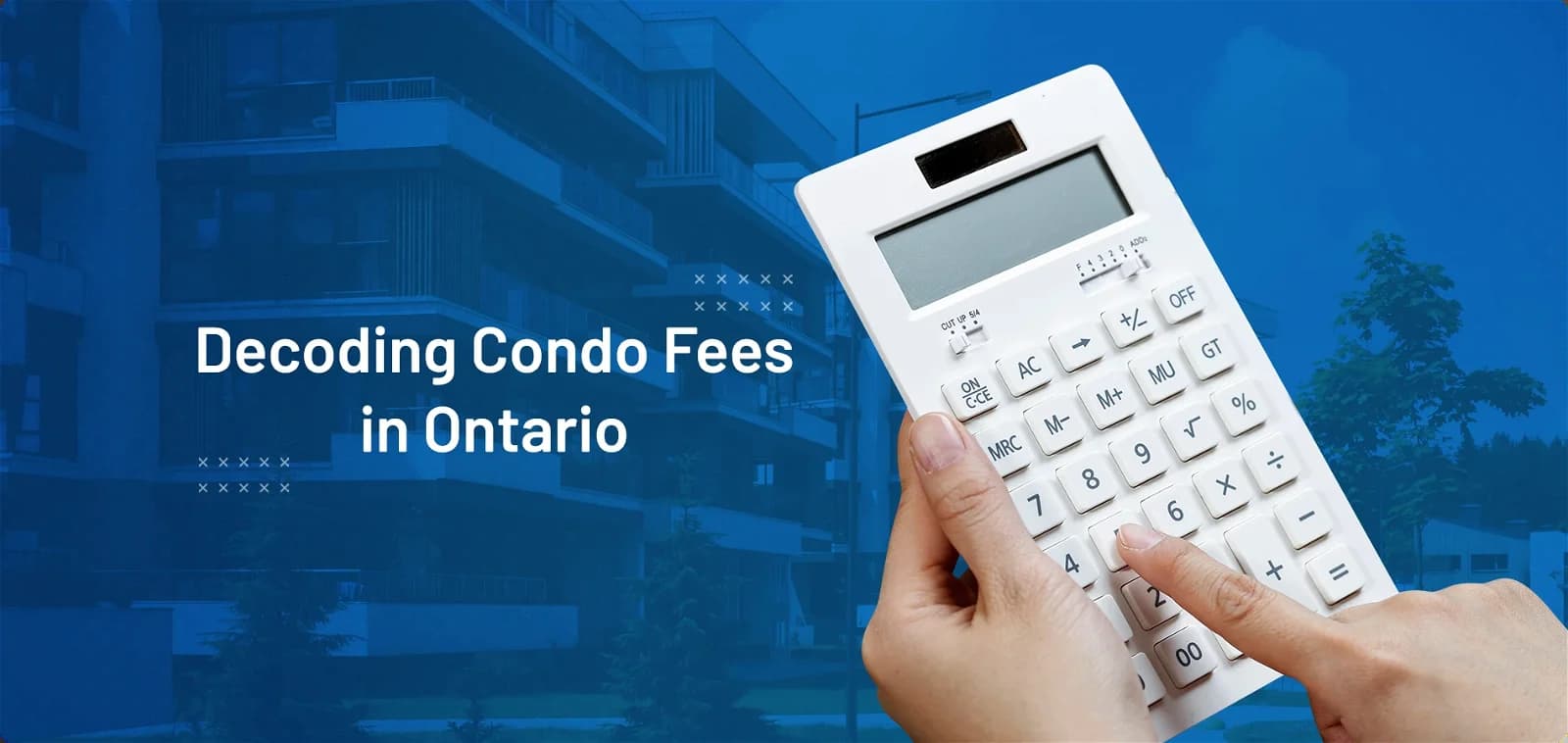Blog Search
Decoding Condo Fees in Ontario: FAQs Every Home Buyer Must Read

Acquiring a condominium in Toronto presents significant challenges. Finding the right building is already a significant undertaking, and when you also consider the challenge of pinpointing the perfect unit within that building, it can often seem like an overwhelming task. That is why understanding the concept of Condo Fees is essential for a successful purchasing journey. A thorough clarity on the subject can be the deciding factor between a smooth purchase and a nightmare for potential homebuyers.
WHAT ARE CONDO FEES EXACTLY?
Condo Fees, also called Common Expenses, are payments that people who own units in a condominium complex have to make every month. These payments are required by the Condominium Act. Some places might call them "Maintenance fees" or "Common Elements fees."
The amount you need to pay depends on how much of the condo you own. This is explained in the condo's declaration. If you also have a storage space or a parking spot, you might have to pay extra for those. You can find all the details about these charges in the documents that set up the condo, like the Declaration and Description. These documents are part of the Status Certificate.
Remember, you can't avoid paying these fees if you own a condo. If you don't pay, the condo association can put a claim on your condo. Even if a condominium doesn't have people living in it, like ones with just shared spaces, they can still make people pay common expenses.
WHAT EXPENSES ARE INCLUDED IN THESE FEES?

Condo fees cover a monthly dividend payment that contributes to the operational costs of the building. The specific operational expenses can differ based on the particular condominium corporation and may involve items such as maintenance outlays, contributions to the reserve fund (explained below), building insurance, electricity, water fees, and in some cases, even internet charges.
The range of services covered by condo fees can expand to incorporate utilities like electricity and water, contingent on the architectural design of the building. Occasionally, buildings might also establish collective arrangements for services like cable TV, internet, or other digital amenities, and then distribute the subsidized expenses among the residents through the fees they pay.
WHEN MIGHT CONDO FEES RISE?
These fees usually experience an annual increase. As stipulated by the Condominium Act, the common expenses are outlined in the condominium's declaration. This declaration also outlines the proportion that each individual owner is responsible for in terms of the common expenses.
Condo fees consist of two components: the operating contribution and the reserve fund contribution.
The operating contribution is established according to the condominium corporation's yearly budget, which must be meticulously outlined and communicated to the property owners. It is during this period that modifications to the common expenses are commonly implemented.
RESERVE FUND EVALUATIONS
Every condominium is required to establish a Reserve Fund, which essentially functions as a substantial savings account intended to cover significant repair costs.
In Ontario, condominiums are mandated to undergo reserve fund evaluations. This requirement extends to new condominium corporations, which must carry out an initial reserve fund study. Subsequently, these corporations must update or redo the study every three years. These evaluations chart out a comprehensive 30-year projection of anticipated repairs and replacements, along with their estimated inflated expenses.
Subsequent adjustments to owners' reserve fund contributions are made based on the discoveries from these studies. Initially, as outlined by the Condominium Act, contributions to a reserve fund should amount to 10% of the operating budget. However, after the preliminary study, these contribution figures can undergo significant changes.
Consequently, in the early stages of owning a new condominium (within the first 1-2 years), there is often a noticeable increase in most condominium fees due to these adjustments. Hence, it is crucial to inquire about the existence of such a study before finalizing a purchase.
ARE CONDO FEES TIED TO UNIT SIZE?
Condo fee, don't always rely exclusively on the square footage of a unit, although size does play a role. Several other factors can influence the proportion of fees payable, such as:
Exclusive use of specific common elements (like a private terrace or balcony)
Characteristics of parking space (size and location), as well as locker dimensions
Availability of services or amenities exclusive to a unit, like a secondary private elevator
Shared operating costs or ownership in condo amenities
For the most accurate determination of the proportion of condo fees, referring to the declaration or status certificate is the recommended approach.
ARE CONDO FEES LIABLE TO GST/HST?

Residential condominium fees are not subjected to GST or HST. The Excise Tax Act explicitly exempts these charges for residential condominium units. However, for commercial condominium units, GST or HST is applicable unless the small supplier rule is met.
The Small Supplier Rule stipulates that suppliers whose annual collections amount to less than $30,000 are not obligated to register and collect GST/HST. For comprehensive insights, it's advisable to seek guidance from a tax professional.
ARE CONDO FEES PART OF THE RENTAL AGREEMENT?
In residential leases, it's generally understood that the monthly common expenses are typically included within the total rent payment, unless otherwise specified. However, there are scenarios where condo fees are not included in the rent.
An example of this situation is often found in commercial triple-net leases, where the tenant bears responsibility for all operational costs, including taxes, maintenance, and insurance (TMI).
The Multiple Listing Service (MLS) incorporates a segment that enables landlords to detail the inclusions within the rent. Typically, it's simpler to incorporate condo fees into the rent and then subtract them from your income statement. If you're thinking about investing in property to make money from renting it out, it's really important to understand how this can affect your overall financial situation.
WHAT YOU CAN DO?
Understanding condo fees can be a bit tricky since they involve various things. Before you make a purchase, it's really important to get a handle on what they're all about. If you're unsure about condo fees and how they work, it's a good idea to talk to a real estate pro. They can give you helpful advice and assistance when you're buying or selling a place.
Blog Search
Popular Blogs
Popular Blogs
The trademarks MLS®, Multiple Listing Service® and the associated logos identify professional services rendered by REALTOR® members of CREA to effect the purchase, sale and lease of real estate as part of a cooperative selling system.

